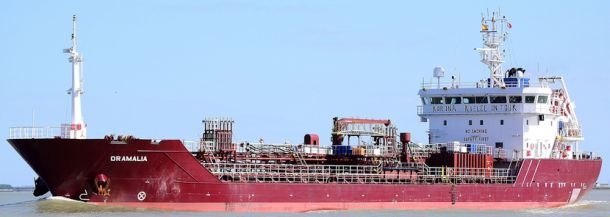
For the second time in less than two months’ time, the very same oil tanker has made the direct voyage from occupied Western Sahara to the port of Rotterdam. The Dutch government clarifies the content of the ship.
Today, the oil tanker Oramalia has made yet another controversial call into the port of Rotterdam. A similar transport was made on 15 October 2019.
As reported by Western Sahara Resource Watch (WSRW), there was reason to assume that the October arrival of the same vessel related to imports of fish oil into Netherlands. That speculation has been confirmed by the Dutch Food Authorities, the NVMA (Nederlandse Voedsel en Warenautoriteit) in a mail to The Netherlands Foundation for Self-determination in Western Sahara, a partner of WSRW.
The trade is controversial, as Morocco is illegally occupying the former Spanish colony of Western Sahara. While half the people of Western Sahara live in refugee camps in neighbouring Algeria, Morocco is now financing its costly occupation by selling the Saharawi's fish, in the form of oil, on tank ships destined to Rotterdam.
The NVWA writes that it checked three samples of the first shipment in October 2019. “The certificates comply with the legal requirements. For the sample of fish oil destined for animal food, this is the model in accordance with EU Regulation Nr. 142/2011, Annex XV, Chapter 9. For the sample of fish oil destined for human consumption, this is the model in accordance with EU Regulation Nr. 2074/2005, Annex VI, Chapter IV”, the inspecting veterinarian writes.
It would thus appear that the cargo aboard the Oramalia consisted of both fish oil meant for making animal food, and fish oil that is meant for human consumption. This is relevant from a perspective of taxation. Western Sahara is to be considered a Third State. The Third Country Duty for fish oil destined for animal food production is 0%. However, the Third Country Duty for fish oil destined for human consumption is 16%.
But here is the catch. Even though the Dutch Food Authorities did not specify which exporting companies are mentioned on the certificates accompanying the fish oil, they do clarify that all those companies are included on the EU Commission's list of approved exporters from Morocco. So even though the Oramalia took in a cargo in El Aaiún, occupied Western Sahara, and then set sail for Rotterdam, the certificates will say the exporter was located in Morocco, not Western Sahara. About one in three of the fish products processing plants listed by the EU Commission as approved exporters from Morocco, are in fact located in occupied Western Sahara - including the exporting company responsible for the fish oil aboard the Oramalia.
"We are bound by the European legislation and the lists issued there", NVWA writes.
"The authority to draw up lists of approved companies lies with the European Commission. If certain companies are wrongly included on the lists of Morocco then this will have to be adjusted by those responsible. The European Commission will have to decide to add Western Sahara to the country lists and to make a separate list for companies based in the disputed area. Until this has been implemented, we cannot make any other decision than to view these shipments as having a Moroccan origin", NVWA explained.
Western Sahara Resource Watch finds the Commission's practice highly unethical, on several levels.
"EU officials appear to be diplomatic acrobats: while claiming they do not recognize Morocco's self-proclaimed sovereignty over the parts of Western Sahara that are under Morocco's military control, they have no problem importing goods from Western Sahara as if they were from Morocco. Even if that rips off EU tax payers - in this case the Dutch - by a 16% tax evasion. Profitable business is made on the back of the Saharawis", says Sara Eyckmans of Western Sahara Resource Watch.
EU Court adviser confirms separate and distinct status of Western Sahara
The Advocate General of the EU’s top Court backs the legal status of the people of Western Sahara. Final Judgment expected in a few months.
EU Court adviser: fruit from Western Sahara should not be labelled as from Morocco
Labelling those products as originating in the Kingdom of Morocco instead of originating in Western Sahara breaches EU law, the Advocate General of the EU Court of Justice concludes.
COWI abandons future projects in Western Sahara
After undertaking work for the Moroccan state phosphate company in Western Sahara, the Danish consultancy giant COWI states that it “will not engage in further projects" in the occupied territory.
Report: EU-Morocco fisheries depends on illegal occupation
An external evaluation report on the EU-Morocco fisheries agreement 2019-2023 confirms that the agreement revolves, in its entirety, around Western Sahara.



